Religion: Midrash and Aggadah
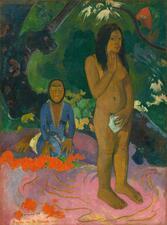
Eve: Midrash and Aggadah
Eve’s character is posited to be that of the original and quintessential woman. The Midrash interprets her traits as representative of the negative aspects of femininity. Eve’s punishment for her sin is also tied to the traditional ideas of the fundamentals of womanhood – childbirth, pregnancy, and male spousal domination.
Feminist Theology

Louise Glück
Louise Glück, American poet, essayist, and educator, was the recipient of the 2020 Nobel Prize in Literature, as well as numerous other awards for her writing; she also served as poet laureate of the United States from 2003 to 2004. One finds the personal, the mythological, and the Biblical woven intricately throughout Glück’s oeuvre.
Gomer, daughter of Diblaim: Midrash and Aggadah
According to the Rabbis, God commanded Hosea to marry Gomer, the daughter of Diblaim, to teach him proper conduct for one who was to prophesy to Israel. Despite Gomer’s harlotry, the rabbis interpret her story as proof that, even when God is angry with Israel, God still loves Israel.
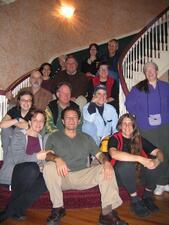
Lynn Gottlieb

Hagar: Bible
Hagar is Sarah’s Egyptian slave woman, whom Sarah gives to Abraham as secondary wife and who would bear a child for him. After Hagar becomes pregnant, Sarah treats her harshly. Eventually Hagar flees from her mistress into the wilderness, where God’s messenger speaks to her. Hagar has long represented the plight of the foreigner, the slave, and the sexually abused woman.

Hagar: Midrash and Aggadah
Hagar is the subject of much interpretation by the rabbis, who portray her as a spiritual and even righteous woman. The rabbis often depict her relationship with Sarah as harmful and fractious, though some traditions identify her with Keturah, taken as a wife by Abraham in Gen. 25:1; in this interpretation, after their divorce she remarried Abraham after Sarah’s death.
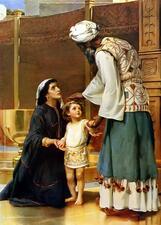
Hannah: Midrash and Aggadah
Hannah is depicted by the Rabbis as a righteous woman who was devout in her observance of the commandments and tested by God through her infertility. Her story is the basis for much of the rabbinic conception and rules of prayer.
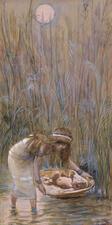
Hebrew Women in Egypt: Midrash and Aggadah
The Rabbis famously maintain that the Israelites were redeemed from Egypt by merit of the righteous women of that generation, who strove mightily to continue to bring forth children, regardless of the grueling servitude and despite Pharaoh’s decree that the male children be killed.
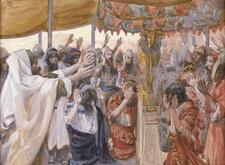
Hebrew Women in the Wilderness: Midrash and Aggadah
The Rabbis portray the women of the generation that wandered in the wilderness as righteous, not caught up in the sins that swept the men of Israel.
Huldah, the Prophet: Midrash and Aggadah
Huldah is one of the seven women prophets. The rabbis explain that she was a descendant of Rahab and Joshua, and that she prophesied along with Jeremiah in the time of King Josiah.
Infertile Wife in Rabbinic Judaism
Only men are legally obligated to procreate, but there is disagreement over whether that obligation compels a man to divorce his wife after ten childless years. The initial infertility of the matriarchs reinforces the efficacy of prayer by demonstrating that the individual matriarchs’ suffering and supplications are what provoked a divine response.

Jephthah's Daughter: Midrash and Aggadah
Jephthah’s daughter is portrayed in midrash as a wise and practical woman, well-versed in halakhah and the Torah. The rabbis place the blame for her murder on her father and the High Priest Phinehas.
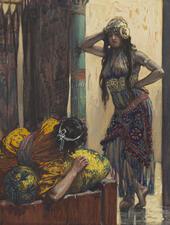
Jezebel: Midrash and Aggadah
Jezebel is portrayed by the Rabbis as a wicked woman who represents the negative influence of Gentile women who turned Israel’s heart to idolatry; an evil woman who causes the king of Israel to stray from the ways of the Lord. Nevertheless, the Rabbis also indicate a favorable aspect of her character.

Jochebed: Midrash and Aggadah
The midrash portrays Jochebed as a wise woman who was righteous and God-fearing. By merit of her good deeds, she gave birth to the three leaders of the Exodus generation: Moses, Aaron, and Miriam.
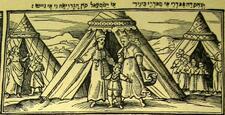
Keturah: Midrash and Aggadah
Keturah was one of Abraham’s wives. The Rabbis describe her as a woman of virtue, for which she was worthy of being joined to Abraham.
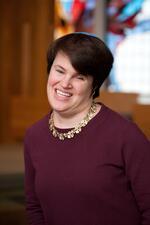
Lauren Tuchman
Lauren Tuchman, the first blind woman ordained as a rabbi, is best known for her championing inclusive Torah and disability justice. Though she is ordained in the Conservative movement, most of her work has been in community organizing and other non-congregational settings.
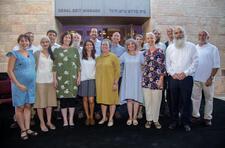
Leaders in Israel's Religious Communities
Since the late twentieth century, Israeli women have begun to assume leadership positions that are undoubtedly “religious” in both content and form. In the Reform and Conservative movements, gender equality has existed for decades, while in the most traditional ultra-Orthodox societies distinctive female religious leadership exists only within halakhic constraints. In modern Orthodoxy, measured changes have led to significant changes over the years and a new generation of religious leadership.
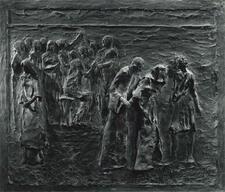
Leah: Midrash and Aggadah
Leah is the sister of Rachel and the wife of Jacob. God blesses Leah with children; she has six sons and one daughter, and two of her sons become ancestors of two of the twelve tribes. She may not have been Jacob’s preferred bride, but she is interpreted as extremely selfless and generous.
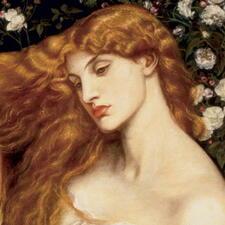
Lilith
Lilith’s character has evolved throughout the years. She began as a female demon common to many Middle Eastern cultures, was transformed by Medieval Jewry into Adam’s first wife, and was finally reclaimed by Jewish feminists as an icon.
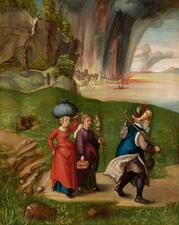
Lot's Daughters: Midrash and Aggadah
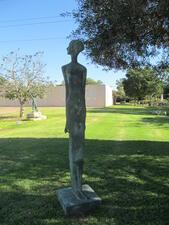
Lot's Wife: Midrash and Aggadah
Lot’s wife was initially spared from the impending destruction of Sodom, but her unrighteous ways cause her to have an unhappy end. Midrash and Aggadah provide insight into her actions.
Maacah 4: Midrash and Aggadah
The Midrash and Aggadah regarding Maacah, daughter of Abishalom, who worshiped an idol, focuses mostly on her pagan worship of Asherah.
Maacah the wife of David: Midrash and Aggadah
Macaah, the wife of David, is a name for a non-Jewish woman taken captive during wartime to be a wife to her Israelite captor. Absalom, the son of Maacah and King David, grows up to be defiant and self-indulgent and acts against his father; this is attributed to him being the son of Maacah.
Maacah: Bible
It is claimed that Maacah is the mother of Asa, king of Judah from 908 to 867 B.C.E., which is problematic because the same woman is alleged to be the mother of Asa’s father. Maacah’s role appears most clearly as an official functionary in the Judean cult when Asa removes her from her position as gebirah (“great lady”) after she makes a cult object associated with the goddess Asherah.


